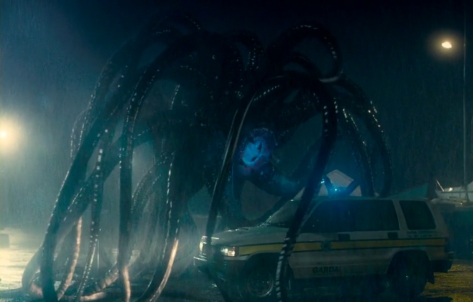
I’ve written about some wildly varying monster comedies, and one of the potential points of variation in them is just how seriously they take their monster—it is still possible for a movie to be a comedy while still presenting us with a monster that is threatening or even scary in a relatively straightforward manner. Alligator is a good example of that, as is Tremors—and the latter is the one that is the most apparent inspiration for the Irishcreature comedy Grabbers, where even the title seems to be a sly reference. The similarities run deep: both are rooted in a certain working class milieu, focusing on a group of small town personalities forced to do battle with a extraordinary menace, with the more ridiculous elements of their generally uneventful lives playing a part, good or bad, in the ensuing chaos; moreover, both are also indebted to classic monster movie traditions, and present those things without intentional subversion (but with inventive creature designs.) It’s an entertaining kind of light horror that doesn’t come around that often—with less overt cynicism or gruesomeness than most horror-comedies—and this one utilizes its setting and its ensemble to very good effect while getting an equal amount of juice out of its monsters.
Continue reading Grabbers (2012)



